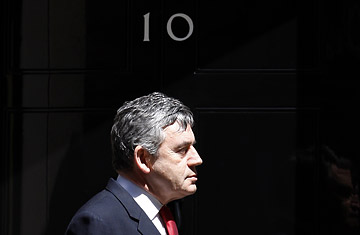
It was billed as a crunch vote, one that the government couldn't afford to lose without fatally undermining the already rickety authority of Prime Minister Gordon Brown. Labour Party loyalists, keen to prevent a rebellion, pumped out that urgent message to persuade all their colleagues in Parliament to back an extension of the period terror suspects can be held without charge from 28 days to 42. The government scraped through with a victory so narrow that the larger questions over Brown's leadership have hardly been put to rest.
Britain's Home Secretary, Jacqui Smith, had spearheaded the campaign for the extension, arguing that the law needs to be updated to reflect the increasing complexity of terror investigations, which often cross borders and involve deciphering encrypted data.
But as the much-anticipated debate and vote on that question finally opened in the House of Commons on June 11, it offered a telling glimpse of how little Britain's lawmakers have updated their own procedures since MPs first moved into their Victorian Gothic premises in 1852. There's no electronic voting; members register their votes by filing into lobbies — one for the ayes and one for the noes — a time-consuming procedure overseen by frock-coated functionaries. The wood-paneled chamber resembles the lounge bar of a country house hotel; its green leather benches can accommodate only around two-thirds of the 646 MPs.
The honorable members were squeezed into their seats like tinned anchovies with the remainder standing 10 deep by the doors as Brown and Conservative Party leader David Cameron squared off at high noon.
Opponents of the government proposal say that the measure is an assault on Britain's legal traditions going back to the Magna Carta. "Terrorists want to destroy our liberties," said Cameron. "When we trash our liberties, we do their job for them." He brushed aside Brown's riposte that the opinion polls showed public support for the measure. "It is popular, but the point is we're supposed to do the right thing in this House."
During the ensuing five-hour debate, a few MPs cat-napped while the remainder wrestled with questions of principle and power. They weren't concerned just with balancing civil liberties against the threat from terrorists, but also with a host of strategic calculations. The Conservatives were continuing a rebranding exercise, which Cameron initiated when he took over as leader in 2005, appropriating some of the values and preoccupations more traditionally associated with Labour, such as a focus on human rights. On the Labour benches, many of the Prime Minister's supporters worried that failure to win the day could precipitate an internal coup attempt against Brown. "Today was all about the durability of this government," said Jon Cruddas, a popular MP on the left of the Labour party, after casting his vote in favor of the measure. "The debate was a bit of an onion," said another Labour left-winger, Jeremy Corbyn, an opponent of the extension. "There was a serious debate about civil liberties. There was a second debate about Gordon Brown."
On paper, Brown triumphed in both debates when the measure squeaked through by 315 votes to 306. Yet the government's knife-edge victory saw 36 Labour MPs, including former ministers, oppose the government, and relied on the support of nine members of the Northern Ireland Democratic Unionist Party. Brown and the DUP politicians have firmly rejected suggestions that their votes were secured through backroom deals. But there is no denying that government whips (MPs who act as the party's disciplinarians) worked up to the last minute cajoling and arm-twisting colleagues into toeing the party line.
"A win is a win," said Cruddas. The Labour leadership now hopes for time to regroup. They are crossing fingers that inquiries into possible breaches of rules on expenses by a few prominent Conservatives will dent the Tories' substantial lead in the polls. But fresh challenges are piling up thick and fast for Labour's hapless leader, including industrial action this weekend by tanker-truck drivers that could cause fuel shortages. Even as Brown breathed a sigh of relief over his narrow escape in the Commons, civil servants were briefing him about an embarrassing security breach in which secret government documents about al-Qaeda were left on a commuter train.
And even the harrowing fight about extending the pre-charge detention period for terror suspects is far from over. The debate is likely to surface during campaigning ahead of a by-election scheduled for June 26 in Henley, to fill the seat vacated by London's new Conservative mayor Boris Johnson. The morning after the terror vote, the Conservatives' shadow Home Secretary, David Davis, announced he is resigning his parliamentary seat to trigger a by-election in his constituency in northeastern England. He says he will use the poll to fight Labour on the erosion of civil liberties. Meanwhile, the new legislation must be approved by the House of Lords. "The Lords will reject it," predicts Corbyn. "Then it will have to come back to the Commons. Gordon would have been better off losing. He won't want to go through all that again."
